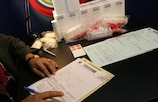U17s receive anti-doping message
Tuesday, May 25, 2010
Article summary
Players from all eight teams at the UEFA European Under-17 Championship received a talk on the dangers of doping in football as part of wider efforts to raise awareness at youth tournaments.
Article top media content

Article body
Dr Mogens Kreutzfeldt and Mike Earl, members of UEFA's anti-doping panel, have given invaluable advice to all the players representing the eight teams at this year's UEFA European Under-17 Championship in Liechtenstein.
The sessions, which have been a part of every UEFA youth tournament since 2005, have played a key role in raising awareness of the dangers posed by doping for both a player's career and their health.
Each of the eight squads have received an hour-long talk warning of the repercussions of being found guilty of committing a doping offence. The overriding message is that all players must assume individual responsibility for making sure they do not break the doping rules.
Earl emphasised that it is not only through the detection of a banned substance in your system that a doping offence is committed. Any refusal to be tested, interfering in the process or giving a banned substance to a team-mate all carry punishments that can reach a two-year ban from the sport.
An explanatory DVD, highlighting UEFA anti-doping procedures, details the increasing number of doping products that have been developed and tells players what to expect if tested.
If asked to give a sample, players are instructed to remain with a chaperone straight after a match or training session and are reminded that they must not return to the dressing room. A rule change brought in last year has increased the requirement for a urine sample from 75ml to 90ml, which must reach a suitable 'specific gravity' so that it is not too diluted.
Such procedures have been put in place by the World Anti-Doping Agency (WADA), which publishes the list of prohibited substances in sport, the detection of any of which can result in punishment. A medical exemption can be sought but must be approved before taking any substance on the banned list.
Players are told to get the advice of their team doctor should they be in any doubt as to the legality of a substance but are reminded that it is only they who will be held responsible for anything unlawful that is discovered.
Dr Kreutzfeldt is keen that players are aware it is not only the knowing use of a banned substance that could put their career under threat. U17 representatives are advised that a professional footballer must remember that they cannot freely take medicines such as cough syrup unless certain it contains nothing on WADA's banned list and that they must be extremely careful with food supplements. Intentionally ingested or not, the finding of a banned substance will carry the same penalty.



